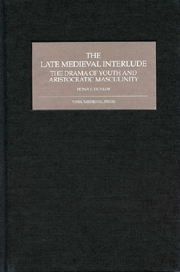Book contents
- Frontmatter
- Contents
- Dedication
- Acknowledgements
- List of Abbreviations
- Introduction: The interlude as a literary genre
- 1 Defining Youth
- 2 Young Masculinity and Late Medieval Discourses of Youth
- 3 Noble Masculinity in the Interludes
- 4 Interludes and the Politics of Youth
- Conclusion
- Bibliography
- Index
- YORK MEDIEVAL PRESS: PUBLICATIONS
Conclusion
Published online by Cambridge University Press: 05 February 2013
- Frontmatter
- Contents
- Dedication
- Acknowledgements
- List of Abbreviations
- Introduction: The interlude as a literary genre
- 1 Defining Youth
- 2 Young Masculinity and Late Medieval Discourses of Youth
- 3 Noble Masculinity in the Interludes
- 4 Interludes and the Politics of Youth
- Conclusion
- Bibliography
- Index
- YORK MEDIEVAL PRESS: PUBLICATIONS
Summary
The interludes Nature, Fulgens and Lucres, The Worlde and the Chylde, The Interlude of Youth and Calisto and Melebea contain finely nuanced discussions of what it means to be a noble and a man at the turn of the fifteenth century. The plays are highly conscious of different kinds of identity generated by the varying intersections of age, gender and status at this time. This book has considered only one of the identity categories represented in these texts in any detail, yet even this limited examination suggests important conclusions.
First, the interludes are intensely aware of the performative nature of the identities they present. Noble masculine nature is only apparent through external signs. It has to be disclosed in appropriate gestures – literally to be acted out. This self-conscious theatricality is not a new idea in the sixteenth century: it is inherited from late medieval traditions of thought about the self, and about how an individual can act out identity in public arenas like the great hall of a household, and the ways in which audiences are fundamental to its construction, as one adapts one's performance, for instance to avoid censure. The plays were performed in the very public spaces where, according to fifteenth-century courtesy texts, individuals were already attuned to observing and evaluating behaviour (both their own and that of others), so they contribute to and comment on the process of constructing a socialized self.
- Type
- Chapter
- Information
- The Late Medieval InterludeThe Drama of Youth and Aristocratic Masculinity, pp. 122 - 126Publisher: Boydell & BrewerPrint publication year: 2007



